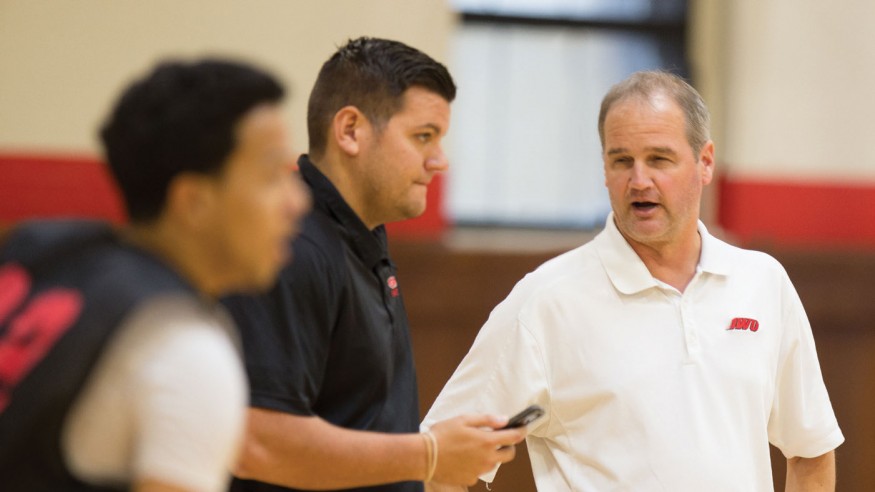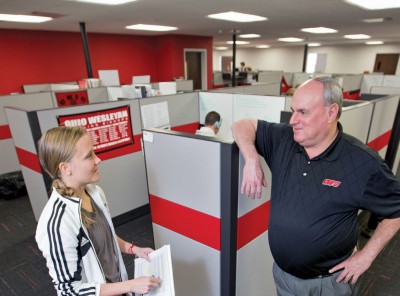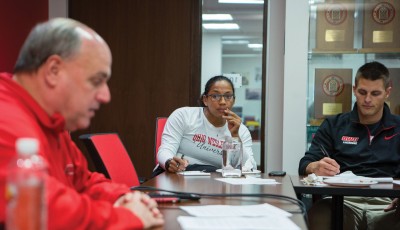
Coaching up the Coach
Mentoring Young Coaches Pays off and Pays Forward
You always hear about coaches mentoring players. Some of those athletes go on to be coaches, themselves.
At Ohio Wesleyan, our coaches are also mentoring…other coaches.
“Coaches usually are a combination of people they’ve played with or worked with—both good and bad,” says Athletics Director Roger Ingles.
Ohio Wesleyan is fortunate to have several coaches who have excelled at mentoring others.
Mike DeWitt ’87, the Battling Bishop men’s basketball coach since 1999, has had five of his former Ohio Wesleyan assistant coaches go on to become head coaches at other schools, including John Ellenwood (Ashland), Scott Cutter (Defiance), Scott Cooper (Indiana-South Bend), and Jon VanderWal (Marietta).
“I feel as a head coach, I have a responsibility and a duty to help assistants achieve their career goals,” DeWitt says. “Mentoring is a very important part of what I do. My philosophy of working with my assistant coaches is to give them a lot of responsibility—it looks great for them with future employers, and it is good for them in terms of learning what coaching is all about in our situation.
“One of the first things I have new assistants do is research what makes Ohio Wesleyan great, so they can communicate that to the people we recruit. I don’t tell them what’s great about OWU; I want them to learn it on their own.”
Kris Boey, director of track & field and cross country, also favors some independence in his approach, preferring to lead by example.“The mentoring process is valuable—there are so many nuances to coaching that go beyond X’s and O’s or specific kinds of training,” he says. “It’s important for all, whether a new coach or experienced coach, to be presented with alternative or creative ways to think about things.”
Boey counts among his mentors his college coach and the coach for whom he worked in his first job out of college, but feels that the most important one is Marv Frye, who was track & field and cross country coach at Ohio Wesleyan from 1960-97.
“Only once has (Marv) given me unsolicited advice. He’s always willing to listen and consider my situation. Sometimes he had advice, sometimes he would just listen and that was enough for me to think it through myself.
“For me, even though I’ve been doing this for 18 years, I don’t necessarily see myself as a mentor. I want my staff to feel they have a vested interest, a partnership to as much of a degree as I can make it. I’m not going to ask someone to do something I haven’t done as a coach or I’m not willing to do as a coach.
The mentoring process is valuable—there are so many nuances to coaching that go beyond X’s and O’s.
Director of track & field and cross country
Mentees Return
Boey is proud of the number of Ohio Wesleyan alumni who, formally or in volunteer capacity, have come back to coach with him over the years. “That wouldn’t happen if they didn’t believe in our values as a program,” he says. “It’s rewarding to see them communicate with student-athletes the same values I communicated to them as student-athletes.”
Sarah Bechtel ’14 (a current member of the Ohio Wesleyan coaching staff), Andrew Bloom ’09 (a current assistant coach), David Franklin ’12 (a current volunteer assistant), and Kale Booher ’12 (a current volunteer assistant) are just a few of the alumni who have come back to Ohio Wesleyan to coach under Boey.
“I had a good experience here (as an undergraduate),” Bechtel says, “and that’s why we have a lot of alums come back and coach. My concern (about returning to Ohio Wesleyan) was development-wise. I was here four years and saw the system, and I was wondering how much I’d learn coming back, but Kris is well-connected and the whole staff is pretty experienced. I know that I can get guidance in other events from experienced people.”

Another Ohio Wesleyan coaching legend, Dick Gordin ’52, was mentored by some of the Pantheon of Ohio Wesleyan coaches. George Gauthier, Sterling Geesman, Bob Strimer, Frank Shannon, Les Michael ’40, and Ray Leech ’54 were among those who Gordin counts as his mentors.
“Strimer was my advisor and freshman baseball coach,” Gordin says. “I didn’t play any of the sports (Gauthier) coached, but I took courses he was teaching. Shannon helped me a lot. He had kind of been a hero of mine when I was a kid (during his playing days at Wittenberg), and he was a mentor of mine when I was a young coach.”
In 60-plus years as a student, coach, faculty member, administrator, and emeritus, Gordin has had an impact on countless coaches. Listing only his former student-athletes who have become golf coaches would be an undertaking in itself.
One of the coaches who Gordin mentored is Roger Ingles.
“When I first got here (in 1984), I looked to Dr. Gordin, Gene Mehaffey, and Ray Leech,” Ingles says. “Jay Martin had the best men’s soccer program in the 1980s, and we took some things he was doing and applied them. Some of the other people I’ve really enjoyed working with—Mary Parker and Laura Bump—taught a different way of doing things, a different philosophy, different approaches to coaching.
“Even to this day, from an AD standpoint, I talk a lot with Dr. Gordin and Jay. Both of them have been in this seat. The best mentor you can get is someone who’s been in the job and done it well.”

Ingles is looking to leverage some of the knowledge on the Ohio Wesleyan coaching staff by working with Trey Keeley, assistant men’s lacrosse coach, and Annie Isler, assistant women’s basketball and women’s tennis coach, to set up formal mentoring sessions for newer coaches on the Bishop staff.
“The idea that’s going to be put in motion is to get some young coaches together for a brown-bag lunch once a week or every other week, and each time bring in an experienced coach who will offer their experience in recruiting or (coaching),” Keeley says.
Mark Beckenbach is associate director of media relations and sports information director at Ohio Wesleyan.
